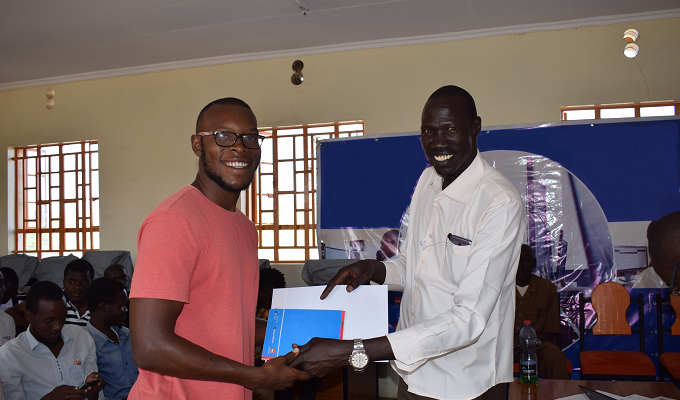

Refugees in Kenya tap global freelance job markets online
Inside the Kakuma refugee camp, a vibrant informal economy — with some 2,000 small businesses including¬ retail stores, food markets, coffee shops, restaurants and other services — offers entrepreneurial and income-earning opportunities for the camp’s 180,000 inhabitants. But beyond the camp few opportunities for work exist in this remote northwest corner of Kenya.
Now, thanks to a training programme launched by the International Trade Centre and the Norwegian Refugee Council, refugees and people from local host communities have learned new skills and accessed new markets for jobs that can be performed remotely over the internet. Services such as data entry, transcription, web research and advertisement design offer access to job opportunities far beyond Kakuma via online jobs platforms, such as Upwork and Freelancer, where companies invite bids from freelancers for available assignments around the world.
A key focus of the training pilot was to guide participants in upgrading their creative capacities to develop online marketing skills. Through the programme, trainees learned ways to channel their skills to tap work opportunities with local businesses and with prospective clients on international portals.
The training enabled freelancers at Kakuma to perform digital marketing jobs that capitalize on their creative skills. For example, a freelancer might be hired to create Facebook advertisements, while another might design a landing page for a top customer.
“There is great entrepreneurial spirit in the camp, but often, entrepreneurs lack the skills and access to capital to realize their growth potential. With the training we’ve offered, refugees can become experts in online marketing,” said trainer Ferdinand Kjaerulff, head of operations at GrowthBond, a digital marketing and financial services firm that led the training in Kakuma.
The Kakuma training programme follows ITC’s Refugee Employment and Skills Initiative (RESI) programme conducted throughout 2018 in the Dadaab refugee camp in eastern Kenya, which hosts close to 250,000 refugees. The Dadaab programme trained Somali refugees and local Kenyans in basic business process outsourcing skills, including data entry, transcription and basic web research.
The three-month pilot programme in Kakuma sought to apply lessons learned from the RESI Dadaab experience. During the RESI Kakuma pilot, participants were trained in online marketing and freelancing skills and offered the opportunity to work with local small businesses to test their skills and build their work portfolios.
ITC also led business development and mentorship workshops for both freelancers and local micro, small and medium-sized enterprises (MSMEs) to provide opportunities for participants to network with potential clients. The local businesses were then invited to hire participants from the training to assist with sales and other tasks, allowing the freelancers to test their new skills.
Upon completion of GrowthBond’s training, the leading online work platform Upwork conducted a five-week freelancing boot camp, allowing 17 newly trained freelancers the chance to interact with clients, bid for jobs, polish up their profiles, and earn small amounts of money performing a sampling of tasks to integrate them into the platform.
“This project seeks to help make economic opportunity more inclusive, supporting underserved populations that often face additional barriers to work," said Anna Ninan, the head of Upwork Foundation, the platform's non-profit arm.
Following the Upwork boot camp, the students were invited to participate in an online freelancing competition on the Experts GrowthBond platform. For one month, freelancers were encouraged to compete for jobs, bid and secure positions, and deliver quality assignments. Featuring six categories testing promotional, advertising and entrepreneurial skills, the competition awarded the pilot’s top six performing freelancers more than $1,200 in cash prizes to support their freelancing businesses.
Such market-based approaches promoted by the Kakuma pilot project leverage international market demand and offer vital income and skills-building opportunities for refugee and migrant populations. Following the successful implementation of the Kakuma training pilot, ITC is launching a high-skills training programme in June 2019 to help connect online freelancers at the camp to jobs in web design, publishing and internet marketing.
ITC also plans to extend the high-skills training project to provide digital and vocational skills training in refugee camps in Dadaab, Kenya, as well as in Hargeisa, Somalia, and to assist trainees in marketing their skills to potential clients and employers in the online freelancing market.



